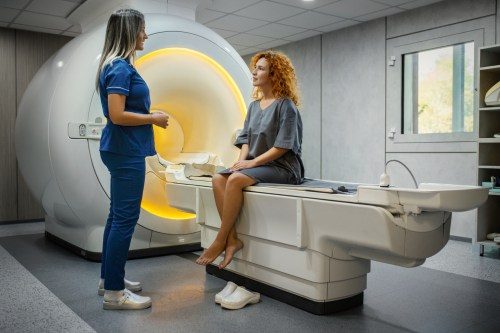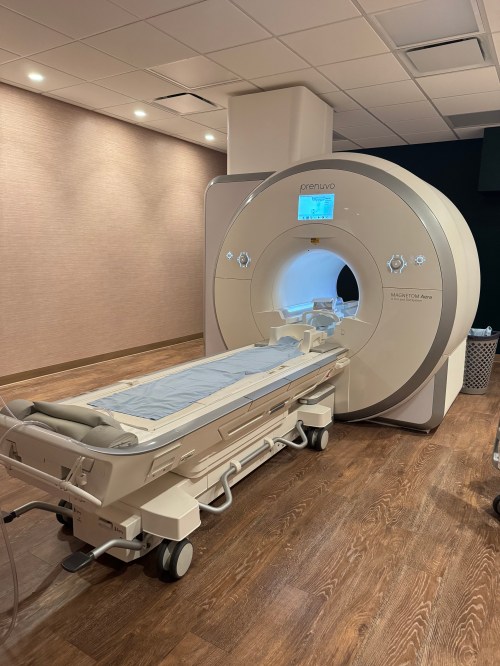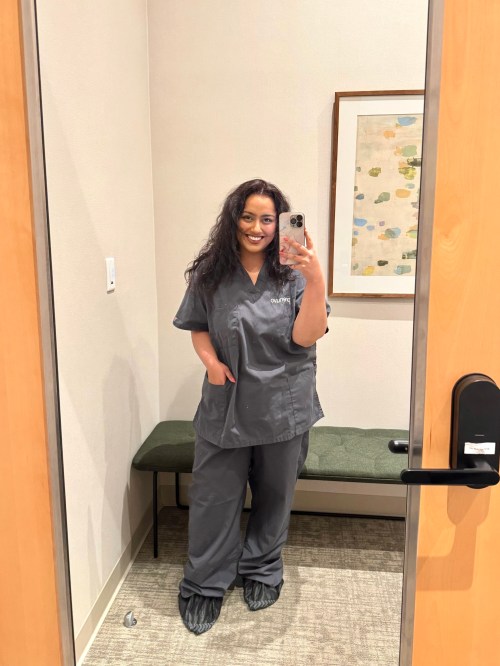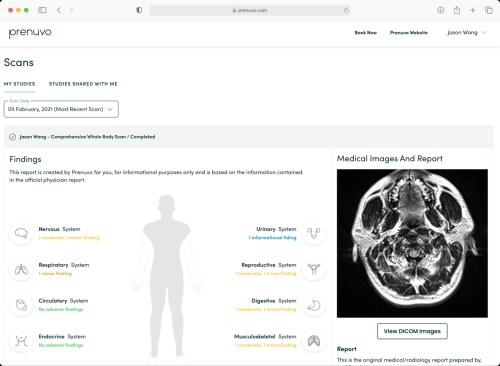I Tried the Viral $2,500 Full Body MRI Scan to Learn More About My Health. Was It Worth It?
And do you need one, too?

You schedule an appointment with your healthcare provider because your constipation isn't going away, no matter how much fiber you're eating. You go in for an imaging scan after hurting yourself diving for the basketball that was already out of bounds. You start taking iron pills because your routine blood test showed you're a little bit anemic.
So much of our individual and societal understanding—and response—to health is reactive. We tend to health concerns after they've already happened. But what if I told you could know about your health status before symptoms even started to manifest?
Meet Prenuvo: the med tech company that's making preventative health and diagnostic testing trendy. Prenuvo offers magnetic resonance imaging (MRI) scans for people looking to learn more about what's going on inside their body and wanting to put their health in their own hands. All you have to do is sit through (well, I guess, lie down through) a 45-minute comprehensive full-body MRI scan, and two weeks later, you receive a report telling you any concerning findings in your organs and body systems.
Sounds like a pretty good trade-off, right? So when I was offered the opportunity to test out this MRI scan for myself, I of course had to say yes. Now that I've received my results, I'm here to report back on how the scan went, what I learned from it, whether it was worth it, and if you need to get one too.
Let's back up—what does this MRI scan do, anyway?
Prenuvo co-founders Andrew Lacy and Raj Attariwala, MD, PhD, had one primary goal in mind when developing the company: to use full-body MRI technology as an early detection testing method for people to learn about their bodies and be proactive about their health.
But here's why they chose MRI specifically. "MRI is widely understood to be the most powerful and accurate imaging modality for soft tissue—and soft tissue means all the organs inside the body," Lacy tells Well+Good. "The challenge has always been that the technology is really slow and therefore very expensive to do [on] the whole body."
Their resolution? Use an MRI that works faster. Prenuvo utilizes multiparametric imaging in its scans, which uses multiple types of imaging sequences so it can capture several images of multiple organs in your body at the same time. This allows the scan to be complete in under an hour, whereas a standard MRI that you might undergo at a hospital would take more time. Aside from its speed, Prenuvo also boasts a safe and noninvasive imaging scan, since it does not emit radiation or use contrast dye, which other imaging methods, like a CT scan or X-ray, might employ.
Alongside their specialized hardware and software, Prenuvo also uses AI to analyze these images. "We also have an FDA-cleared AI algorithm that we're now using to measure muscle volume, the distribution of fat inside the body, and organ size. And we're doing a lot of research into AI, particularly, how you can identify these very early and subtle changes to notice signs of early-stage diseases," Lacy explains. "I think that's the biggest promise of AI—using it to diagnose [conditions] earlier and earlier."

According to the company, the full-body MRI scans over 30 regions and organs in your body and can detect over 500 different health conditions, anywhere from fatty liver disease and endometriosis to brain tumors and spine degeneration. So when I learned this, safe to say there was some apprehension. Do I want to know all this information about myself or what if they find something scary?
But I put my big girl pants on, told myself that knowing about something concerning early could help me take action sooner, and went in for my appointment.
How my MRI experience went
Prior to coming in for my visit, a Prenuvo staff member sent me a survey to ensure that it was safe for me to actually get an MRI done. The survey asked questions like:
- Have you ever had surgery?
- Do you take any medications?
- Are you currently pregnant?
They even asked if I was claustrophobic, because if you are, there's an option to take a light sedative before the MRI to make the experience more comfortable for you. Based on your answers to these questions, the Prenuvo office you're attending will let you know if it's safe for you to proceed with the scan.
When the day of my appointment arrived, there were a few rules I had to follow: stop eating four hours before the scan, ensure that you complete the online medical intake form, bring a government-issued ID, and take all jewelry, metal, and accessories off your body. I changed into scrubs, went inside the MRI machine room, and lay on the table. This was my first MRI, so I didn't really know what to expect. I should've watched Prenuvo's "what to expect" video (alas, I did not, but you should here!)

The technician in the MRI room then put a series of scanner pads all over my body, which kind of felt like a weighted blanket. They also give you a ball that you can squeeze, so if you're feeling uncomfortable or need to talk to someone in the room, your care team will be alerted. And because an MRI is a machine, you'll likely hear a lot of bangs and clangs, which is why they also offer you earplugs and headphones to minimize the noise. The best part? You can also ask your technician to put on relaxing music or a show you like that you can actually watch during the MRI (I chose The Good Place, IYKYK).
Soon enough, the scan began. I spent most of it watching the show, but eventually, I just wanted to close my eyes and relax. And I wish I could tell you that more exciting things happened during the scan, but before I knew it, the scan was over and I was being guided back to my changing room. Once I got out, the patient care concierge led me to a pantry full of snacks and drinks, and then let me know that my results would be ready within a couple of weeks. So, now we wait.
What did the scan find?
I actually ended up getting my results back in a little over a week, and when I got the email, I was a little nervous to open it. You know when you're in school and your professor releases your score on the final to let you know what grade you got in the class? Yeah, *that* kind of nervous. But the results weren't so bad.
When I opened up my report, the online dashboard showed an interactive model with results for nine different body systems: nervous, respiratory, circulatory, integumentary, endocrine, urinary, reproductive, musculoskeletal, and digestive (see below for an example).

My report showed 1 moderate finding, 1 minor finding, and 4 informational findings (which aren't anything serious, just some info about yourself you may want to know or keep an eye on). Here's a more detailed explanation of what each of these findings was:
- Gallstones: This was my "moderate" finding. The scan detected multiple gallstones and recommended that I discuss the presence of them with my healthcare provider.
- Deviated septum: This was my "minor" finding. The image showed deviation of the nasal septum to the left side.
- Endometrial thickness: The scan was able to measure the thickness of the inner lining of my uterus. Your thickness level can change based on your age and stage of your reproductive cycle. This was an informational finding, and I learned my endometrial thickness was normal.
- Thyroid nodule: A tiny thyroid nodule was found on the isthmus of my thyroid. This was also an informational finding, but the report said there was no need to act on it unless I was experiencing symptoms, which I was not.
- Breast tissue: The scan can also tell whether your breast tissue is dense or fatty. My results of this informational finding indicated that my breast tissue is well-suited for mammography screenings.
- Mild prominence of the neck lymph nodes: This informational finding explained that there was some minor swelling in the lymph nodes, which was likely reactive. Mild enlargement or swelling in your lymph nodes usually just means that your immune system is fighting off infection or inflammation, such as when you have the cold or flu.
After I got my report, I was also able to schedule a phone call with a nurse practitioner to help me understand my results. Then, I shared these results with my primary care provider so she could help me learn if there's anything I needed to do based on these findings.
Did I do anything about it?
Let me start by saying my PCP is incredible. Anytime I have a concern, she attentively listens, provides me with reassurance, and orders diagnostics or refers me to a specialist if I need it. And that's exactly how this process went. I sent my full report to her, and just like the MRI, she was only really concerned about the gallstones and deviated septum.
But to be honest with you, I wasn't really surprised by either of these findings on my report. My mom had gallstones, which eventually led to her getting her gallbladder taken out, and my dad had a deviated septum, which is why he got nasal surgery. The apple didn't fall too far from the tree, I guess?
My PCP first explained to me what the hallmark symptoms of gallstones were: extreme pain in the upper right side of the abdomen, fever, chills, nausea, and vomiting. I wasn't experiencing any of these, which meant I had a case of "silent gallstones." According to the National Institute of Diabetes and Digestive and Kidney Diseases, the majority of people with gallstones don't experience symptoms. So if you have silent gallstones, it's likely that the stones aren't affecting your gallbladder or liver function. My PCP let me know that if I don't have symptoms, there's no need for treatment right now. But prevention is important, so she recommended drinking enough water each day, eating more whole foods, and staying active.
But when we discussed my deviated septum, she thought it would be best to put in a referral to otolaryngology (which is just a fancy way of saying ENT). I met with my ENT doctor a couple of months later, and he confirmed my deviated septum by putting an endoscope (aka a small tube with a camera attached to it) up my nose. He asked if I experienced any trouble breathing, to which I laughingly said, "Yeah, my whole life actually." He first recommended trying nasal spray to see if that would help me breathe through my nose better, but when that didn't work, he suggested a septoplasty—the surgery that repairs a deviated septum. Long story short: I'm recovering from said septoplasty as I write this story right now. It's going to take a few months for the septum to fully heal, but my breathing is better and my sleep has improved. Thank goodness for that increase in airflow.
In short, my MRI scan experience with Prenuvo was a great one. I learned more information about what's going on in my body, started taking preventative measures to keep the gallstones silent, and even got surgery to fix my deviated septum—which I probably wouldn't have if I never got the scan done.
According to Prenuvo, their MRI find a potentially life-saving diagnosis in 1 of 20 scans they complete. I'm feeling grateful that I'm part of the 95 percent of people who didn't have to learn about a scary diagnosis. But this also means that I'm glad that the 5 percent of people who did have a major finding on their results learned about it, so they have the knowledge to take actionable next steps.
So, do you need one?
Okay, okay—you've probably heard enough about me, and you're wanting to know how this all applies to you. The big question is: Do you need to get a Prenuvo MRI scan, too? Well, that decision is really up to you, which I'm sure isn't the answer you wanted to hear.
But the reason that's the advice I'm giving you is because your health is exactly that—yours. However, there are some considerations I can offer you to make the decision process easier:
- Cost: The Prenuvo full-body MRI scan that I received costs $2,500. However, there are three other tiers of scans you can choose from. Their "Enhanced Screening" scan is the most comprehensive full-body scan, which costs $4,000 ($4,500 if you're living in NYC), the "Head and Torso" scan is $1,800, and the "Torso" scan is $1,000. At this time, insurance doesn't cover the cost of Prenuvo scans, so you'll need to decide whether the pricing is worth it to you.
- Location: Prenuvo's MRI clinics are located all over the U.S. and have some clinics in Canada and Australia as well. They are also opening more clinics in England, Sweden, Singapore, Switzerland, and the United Arab Emirates. You'll likely have to take into account the distance to the closest Prenuvo clinic located near you.
- Risk of illness: If you have a family history of health conditions, like cancer, or have a higher risk of developing a particular health condition, knowing what's going on in your body and learning if there's something concerning present could be helpful. But if you don't have a high predisposition to serious diseases, you may just receive incidental findings that may prompt additional costly exams, but end up being harmless and don't actually require any treatment.
- Not an alternative to routine screenings: While a full-body MRI scan can be helpful to get an overview of your health status, it doesn't replace the need for routine screenings, such as mammograms for breast cancer or colonoscopies for colon cancer. You will still need to get these specific screenings done, especially if you're in the age bracket for these tests or have a high risk of these conditions.
- Underlying conditions: For people with certain conditions, full-body MRI scans aren't recommended. This includes those with metal implants in their bodies (such as a pacemaker or cochlear implant) or people who are pregnant. You should also prioritize safety before getting a scan like this done, so it's best to check in with your healthcare provider for their approval.
Ultimately, the decision to get a Prenuvo scan rests on your shoulders. Your best bet is to check in with your healthcare provider about their recommendation and advice. They can give you personalized guidance about whether full-body MRI scans are safe for you and explain your individual risks and benefits of getting the scan done, so you can make an informed decision about your body and what it needs.










